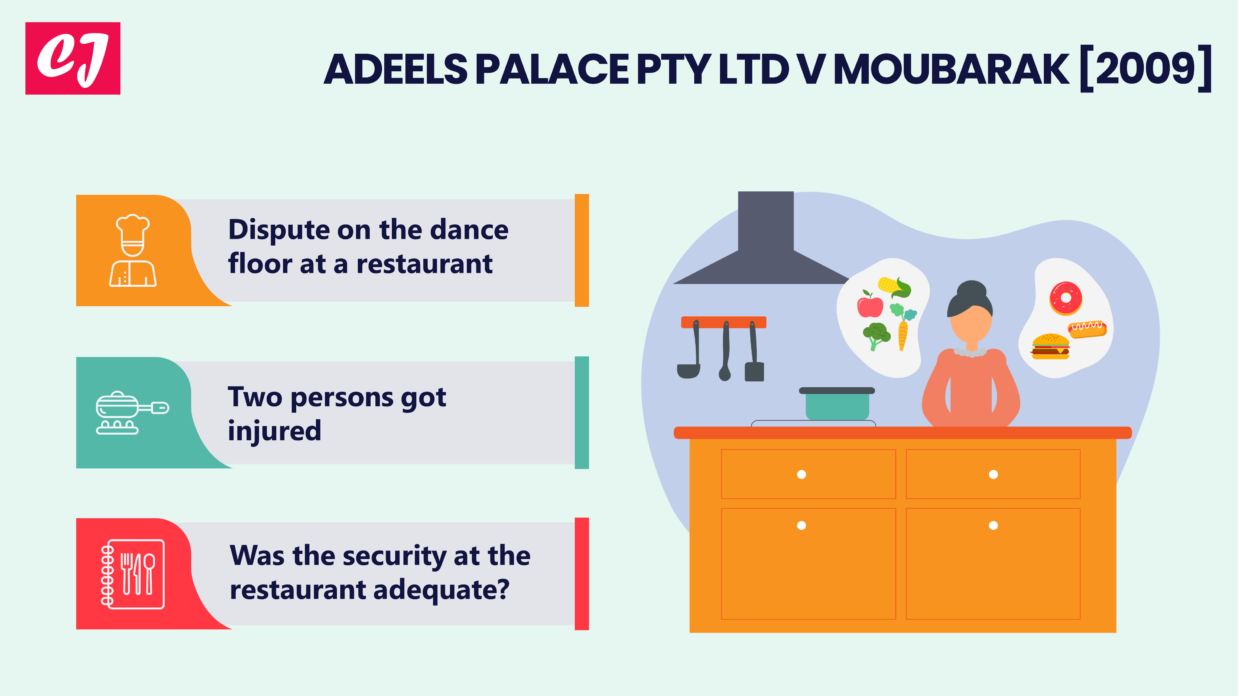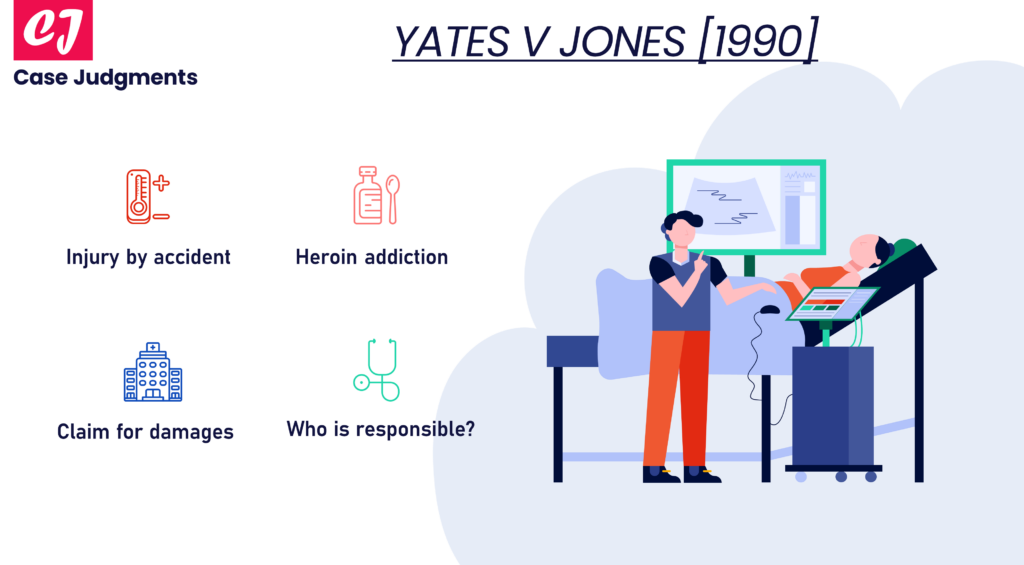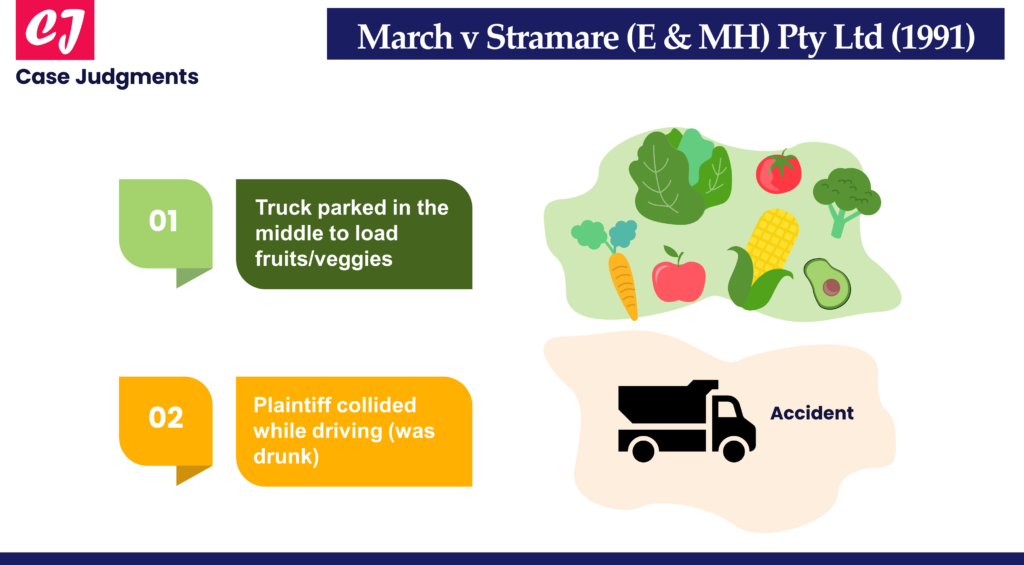
Adeels Palace Pty Ltd v Moubarak [2009]: A Case Summary
Adeels Palace Pty Ltd v Moubarak [2009] is a tort law case involving a physical dispute at a restaurant whereby the plaintiffs got injured. Doubts were raised over the adequacy of security deployed at the restaurant.
Given below are the case facts and decision:
| Case name & citation: | Adeels Palace Pty Ltd v Moubarak, Adeels Palace Pty Ltd v Bou Najem [2009] HCA 48; (2009) 239 CLR 420; (2009) 84 ALJR 19 |
| Court: | High Court of Australia |
| Decided on: | 10 November 2009 |
| The bench of judges: | French CJ, Gummow, Hayne, Heydon and Crennan JJ |
| Area of law: | Negligence; duty of care; the ‘but for’ test; causation |
Facts of the case (Adeels Palace Pty Ltd v Moubarak)
The case concerns an incident that occurred on New Year’s Day in 2003 at Adeels Palace Restaurant in the Sydney suburb of Punchbowl. A dispute arose on the dance floor when a female patron accused another of brushing her hand with a lighted cigarette. The fight escalated very soon with friends, relatives, and other patrons joining in. One man who was struck in the face during the altercation left the restaurant and returned with a gun shortly thereafter. He shot two other patrons (Bou Najem and Moubarak). Moubarak was the one with whom he had got into the physical altercation earlier and who had struck him.
Both Bou Najem and Moubarak sued Adeels Palace alleging that the injuries they sustained were a result of the restaurant’s failure to provide adequate security to them during the New Year’s Eve function.
Issue
Was the restaurant’s lack of security an act of negligence?
Case Hearing
The case was first heard in the NSW District Court and both the plaintiffs were successful. They also succeeded before the NSW Court of Appeal. However, the High Court reversed the decision of both the courts and allowed Adeels Palace’s appeal.
Judgment of the High Court in Adeels Palace Pty Ltd v Moubarak
The High Court decided that the issue in the case had to be determined by referring to the relevant provisions of the Liquor Act 1982 (NSW) and the Civil Liability Act 2002 (NSW).
It said that in accordance with the responsibilities laid under the Liquor Act 1982 (NSW) not to allow indecent, violent, or quarrelsome behavior on licensed premises and to remove individuals who engaged in such behavior, Adeels Palace owed a duty of care to all its patrons including Bou Najem and Moubarak. There was a duty to exercise reasonable care in preventing injuries that could result from violent, indecent, or disorderly behavior of other persons.
However, the High Court found that it was not necessary to establish whether there was a breach of this duty or not.
This is so because according to Section 5D of the Civil Liability Act, it was required for Bou Najem and Moubarak to demonstrate that the restaurant’s negligence in providing them with adequate security was a necessary cause for the injuries suffered by them. And, the evidence presented did not establish that the provision of greater security (to the level to which Bou Najem and Moubarak had argued that it should have been provided) would have prevented or deterred the gunman from re-entering the restaurant. The evidence only showed that if there had been more security in the restaurant on New Year’s Eve, it might have prevented the damage caused by the gunman. But it did not show, on the balance of probabilities, that greater security would have prevented the injuries caused. Thus, the ‘but for’ test of causation was not satisfied.
Hence, the High Court decided in favor of Adeels Palace and set aside the orders of both the Court of Appeal and the District Court.
List of references:
- https://www.hcourt.gov.au/assets/publications/judgment-summaries/2009/hca48-2009-11-10.pdf
- https://s3.studentvip.com.au/notes/7650-sample.pdf
- https://legalhelpdesklawyers.com.au/2014/11/10/adeels-palace-pty-ltd-v-moubarak-adeels-palace-pty-ltd-v-bou-najem-10-november-2009/
You might also like:
More from tort law:

